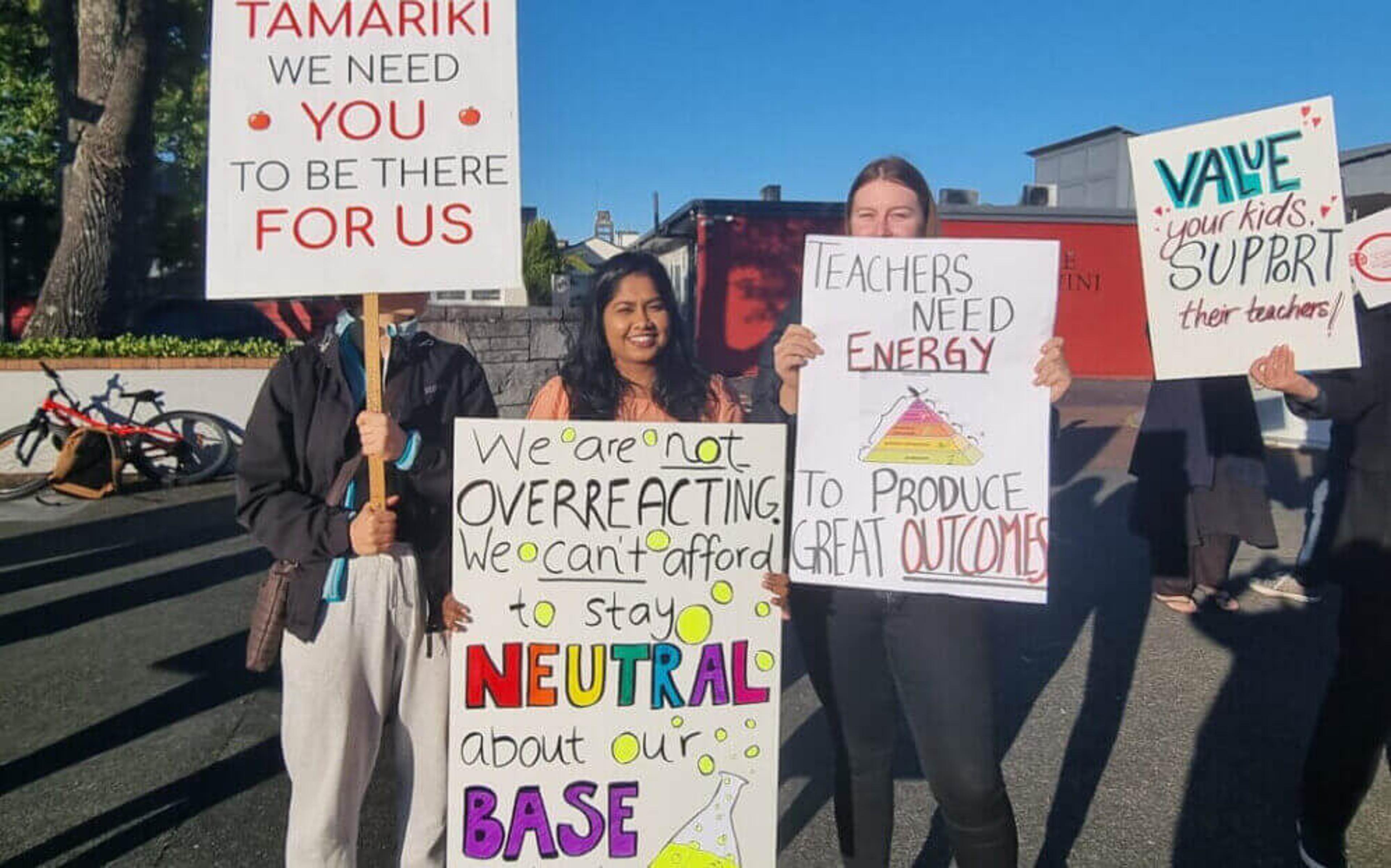

Thousands of secondary school teachers across the motu marched the streets again this week.
Supplied
'Living and surviving are two different things' say striking teachers
Teachers are demanding better pay in their second strike action in a month



Pasifika Rugby leaders rally for voting rights after narrow defeat

Vi Hausia calls for stronger community engagement and increased voter turnout

Tā, ruḁ, häke: Let's celebrate Rotuman Language Week!


From mattresses to marijuana: Auckland’s illegal dumping grows

Pasifika Rugby leaders rally for voting rights after narrow defeat

Vi Hausia calls for stronger community engagement and increased voter turnout

Tā, ruḁ, häke: Let's celebrate Rotuman Language Week!
Thousands of secondary school teachers across the motu marched the streets again this week.
This just two weeks after the last strike saw 50,000 teachers walk off the job.
Teachers are demanding pay increases to meet the rising cost of living and better working conditions.
Ōtāhuhu College physical education teacher Moana Toleafoa stayed home in strike today, she says she struggles to make ends meet on her current wage and future plans are out the window.
"I don't feel like my pay matches my living costs, only because living and surviving are two different things. The pay that I am on now is just helping me survive," she says.
"I can't pay for my rent now and can only wish about buying a house in the future."
One Tree Hill College English and Media Studies teacher Louise Ryan was among those striking in Tāmaki Makaurau.
"To be able to do my job I need the working conditions and the pay so that I will be able to afford to live in the city that I want to teach in and have the capacity to support all of my students."
Ryan says teachers are steadily leaving the industry.
"We are struggling to keep teachers in this profession. A lot of young teachers leave after the first five years or we can't find the specialist teachers to put in front of our kids. You don't want a history teacher teaching chemistry."
Onehunga High School former year 9 dean Jordan Schaumkel says teachers are taking a stand because they feel their needs aren't a priority.
"I don't think the government has done enough since the agreement last time. There were some things they couldn't promise on like support and incentivising teaching roles.
"At the moment the government aren't doing enough to attract new and young teachers to the profession."
Students' fear their education is at stake
Highschool students in Tāmaki Makaurau are also feeling the affects of another turbulent school year, with some saying they're sympathetic towards their teachers but it has also brought more disruption.
"As a year 13 student, it's been kind of hard because a lot of internals have been due on stuff that we're supposed to have been learning," says a student, who did not wished to be named.
"It's hard when there's a lot of strikes and teachers aren't getting what they deserve because then it puts us back a bit.
"This year we had the cyclones and all that, the last two years our teachers have been working really hard to give us a some work to do at least. But I know lots of kids just didn't do it."
Support and recognition for teachers work
Acting Post Primary Teachers Association President Chris Abercrombie acknowledges the work Māori and Pacific teachers put in towards better education outcomes.
"One of our condition claims is about recognising the really special role that Māori and Pasifika teachers play in our schools and our communities," he says.
"We know Pasifika teachers take on a lot of extra work, so it's really vital to us that they are properly recognised."
Abercrombie says that while strikes have caused disturbance, the purpose of the action is to "get it sorted" as negotiations have been ongoing for almost a year.
"We absolutely recognise the disruption that many schools are facing, but what's more disruptive is not having subject specialist teachers in front of them."
He says the current proposed agreement comprises a $6000 lump sum payment to teachers over two years and translates to roughly a 10 percent increase for new teachers and a six percent increase for senior teachers on the pay scale.
"Teachers have not had a pay rise since July 2021 and things have got a lot more expensive."
Finding a way forward
Education Minister, Jan Tinetti, believes pay increases alone won't solve the concerns of teachers.
"I'm not saying that the money isn't important, it absolutely is. But we're also looking at how we can make the job more attractive in the work load area as well.
"To say that it's one without the other is disingenuous to those teachers. I've been there, I get this and we're working on getting the balance right."
Tinetti says good progress had been made in negotiations since the earlier strike this month, so it's disappointing to see teachers taking industrial action again so soon.
However, she acknowledges the pressure teachers are under and says the ministry is working towards resolutions.
"We know that they've got some big claims on the table, we know that we need to get things right for them but we can't get everything right in one bargaining round."
Further action is planned for term two, including rotating learning-from-home days for different year levels, and rolling teacher strikes for different regions.

